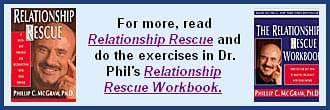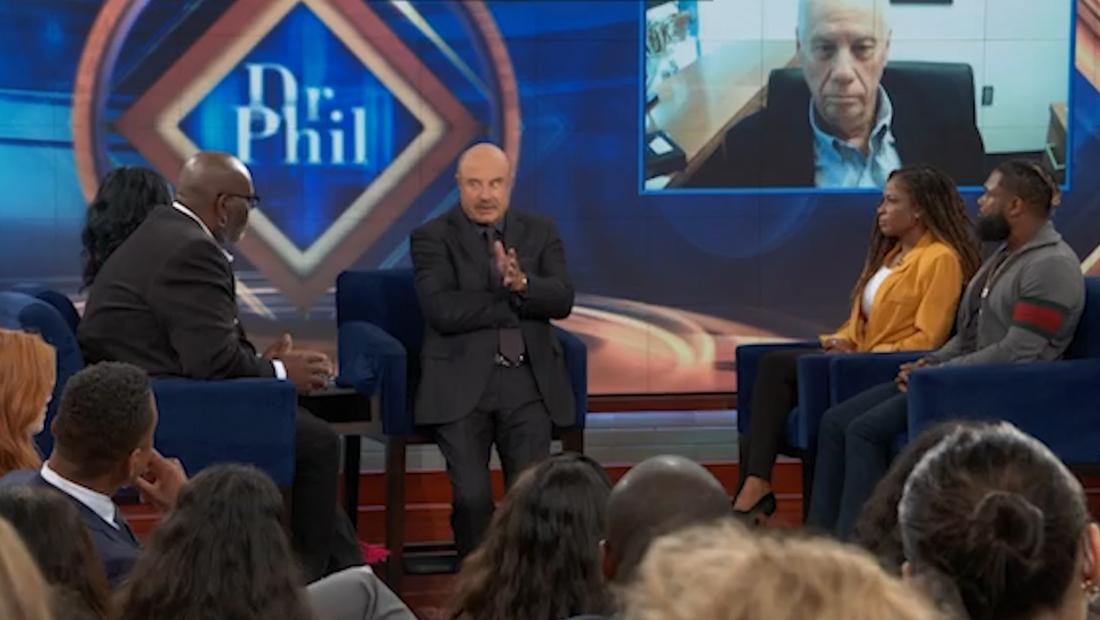Dr. Phil's Rules For Dating
Are you looking for Mr. Right but only finding Mr. Wrong? Dr. Phil shares advice to help enhance your dating life.
Dr. Phil answers the questions everyone wants to know about his groundbreaking series "Relationship Rescue Retreat," where six couples on the verge of divorce are sequestered in his studio. The intense workshop is designed to give them a wake-up call about the state of their marriages as well as the tools to reconnect.
Q: What can you tell us about the state of marriage in our country today, and why would that make you think that we need a Relationship Rescue Retreat? A: Well, I think that we have an epidemic of marriage problems in America; I don't think this is just something that's kind of creeping in. I think this is at absolutely epidemic levels. Divorce rates have crossed 50 percent, and that doesn't even include the emotional divorces that are going on. So I think it is a serious problem, and we wanted to meet it head on.
Q: So what is the Relationship Rescue Retreat? A: The Relationship Rescue Retreat is a workshop where I took six couples; we went behind closed doors, rolled up our sleeves, and we just drilled down on what was really going on in these marriages. It is fast-moving, it is hard-hitting, and it's the most realistic view of what's happening in American marriages that I think anybody will ever see.
Q: How did you choose the six couples that were involved, and what did you require from them? A: We chose these six couples to represent as many different marriage scenarios as we could throughout the American population. We chose couples that were different ages, different lengths of marriage, and brought different problems into the workshop. We have infidelity, we have physical fighting, we have emotional withholding, we have kid issues, we have blended family issues, we have all of the things that are at the heart of marriage problems in America.
Q: This is certainly not the first time you've done this kind of thing. Did you have them use your book, Relationship Rescue? A: Relationship Rescue, the book, is clearly a guide for what we do in the workshop, because it reflects all of the work that I've done over the years with relationships. So the work came first, it was memorialized in the book, and then we used it as a manual for what we are doing here now.
Q: You say that relationships actually aren't 50/50. How do you think the commitment and the work involved in relationships is supposed to split up? A: Relationships are not 50/50. That's just some politically correct thing we decided to start saying in the 80s when we decided to fix the marriage plan, and it led us to these double digit divorce rates. Marriage is 100 percent/100 percent. And I say that because you are responsible for yourself in the marriage. You are responsible for what you bring to the marriage, what you elicit from your partner, what you maintain or allow with your partner. You need to look at you. Marriages are fixed from individuals healing from the inside out.
Q: One other thing you asked the couples in the retreat to look at was the parental legacy. What was the purpose of that? A: I wanted people to look at parental legacies because I believe the poem is correct: Children learn what they live. If you grew up with really bad modeling, if you grew up in an emotional divorce, in a chaotic household that had fighting and violence, and all sorts of toxic problems, then that's what you learned and that's what you expect from yourself and from your partner, so that's what you create. I want us to keep what we need to from our parents, the good things that we can carry forward, but we need to jettison the rest of that stuff. The problem is that then couples don't know what to put in its place. And we answer a lot of those questions in this workshop.
Q: You mentioned that some of these couples fought in front of their children. What's the cost of that? A: Fighting in front of your children is an absolute no-no. When you yell and scream in front of your children, you don't just create a bad moment for them, you change who they are. The fight may last 15 minutes, but the scar, the damage, the fear, the hurt, the anxiety that's created can last an absolute lifetime. And we see that in these couples: They grew up with that, they internalized it, and it contaminates their marriages to this very day. Do not fight in front of your children. Have the control to take it private and keep it private.
Q: If there are so many relationships and marriages that are in such desperate straits, why are these couples even staying in the relationships? A: I think people stay in relationships that aren't working because they don't want to admit the failure. I think they stay because they take seriously the commitment they made, they take seriously the children and their future and their plight. So I think these people are hanging on, and they're trying to do the right thing, and trying to find their way out of the maze. It's not that they don't want better; it's just that they don't know how to do better.
Q: So how does a couple in crisis begin to heal their marriage? A: If you are a couple in crisis, you begin healing your marriage by looking inside yourself. You begin healing your marriage by saying, "What can I do today, and every day, to make this marriage better?" It's not a standoff: "When he or she does better, I'll do better." Don't do that. You need to be the big one, you need to step up and introduce something new. Ask yourself how much fun you are to live with. I mean, get a smile on your face. Get a new attitude. Begin to get back to being your own best friend, and you will elicit different responses from your partner.
Q: What do you mean when you say that couples need to ask themselves if they'd rather be right or be happy? A: When I talk to couples, they always fight about who's right. Who's right about money, who's right about in-laws, who's right about parenting, who's right about all the issues that come up in a marriage. But you know what? Being right does not generate the results that you want. Maybe it's about compromise. Maybe it's about finding a way that both of you can have some validity and be right. One of the most important negotiation tactics that I've ever learned and used is trying to find out how to get the other party as much of what they want as I possibly can, because if they're getting satisfied, they're more likely to satisfy your needs. So, it's not about being right. Make yourself happy by generating the results that you wish you had.
Q: How does a relationship survive a crisis like infidelity? A: Infidelity is huge crisis in marriage, there's no question about it. It creates all kinds of long-term hurt, fear, anxiety, all of the destruction of trust. And this is a bad thing that lingers on and on and on. But you can get past this. Look, forgiveness is a choice. Redefining your relationship is a choice. And if you are having an affair, my advice to you is turn back toward your marriage to solve your problems, not away from it. And if you are thinking about doing it, I'll guarantee you it is a dead-end street that is headed for disaster. If you have problems within your marriage, solve them in the marriage. You won't fix it by introducing an outsider.
Q: Can all relationships, or maybe, should all relationships be saved? A: The truth is that not all relationships can be saved, and not all marriages should be saved. I believe that there are some absolute deal breakers in a relationship, such as physical violence and addiction to drugs and alcohol. If some of these things are present in your relationship, that's a huge stop sign. And unless and until that gets dealt with, you don't have a future in that relationship. So, no, I don't think all marriages can or should be saved.
Q: You told the couples in the Relationship Rescue Retreat that you would tell them whether you thought they should stay married or whether you thought they should split up. How can you tell that? And do you have the right to tell others that? A: Well, I think people want feedback. I think they want information from someone who takes an objective look from the outside. And I always tell people the truth as I see it. I don't ask them to substitute my judgment for their own, but I will tell them what I see, and I will tell them what I think and why. If what I say won't withstand challenge, then it's not worth listening to. So, again, it's not about being right, it's not about whether I'm right or not. It's about giving honest feedback when it's asked for.
Q: So by the end of this challenge, will we hear your thoughts on who should stay together, and who shouldn't? A: As we progress through this, I'm going to be very honest with these couples about who I think should stay together, who I think shouldn't stay together, and I'm also going to tell them why, and what they need to do to change that prediction of mine if they want to. Life is about choices, and marriage is about choices. I say it is never too late if you're willing to make the changes, and make different choices.
Q: What do you think the viewers can expect to gain for themselves as they watch this retreat? A: I think the take-away for viewers from watching this retreat is going to be huge. Because I think they can see in each of these people parts of themselves, parts of their own marriage. And they're going to watch these people as they go through the process of trying to achieve resolution. So I hope people will live vicariously through those who are in the retreat, and say, "That's a good message, I see that now, I need to change that now, I want to apply the things that were provided educationally to them firsthand."


Are you looking for Mr. Right but only finding Mr. Wrong? Dr. Phil shares advice to help enhance your dating life.

After meeting the six couples in Dr. Phil's "Relationship Rescue Retreat," the audience asks Dr. Phil their questions.

You can't control your partner. You can't make changes for your partner. You can't tell your partner what to do. But you can inspire your partner....